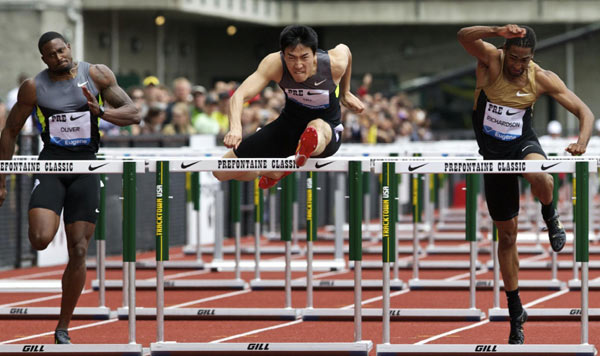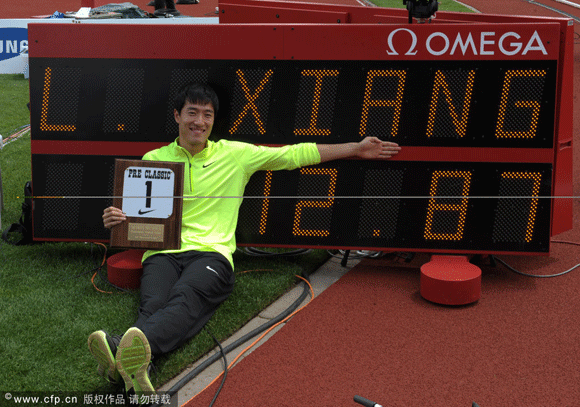Liu back at his best in bid for redemption
 0 Comment(s)
0 Comment(s) Print
Print E-mail China Daily, June 6, 2012
E-mail China Daily, June 6, 2012
In 12.87 seconds on an Oregon track, China's Liu Xiang banished five years of injury-filled misery and annointed himself favorite to reclaim the Olympic gold he relinquished so painfully in Beijing four years ago.
 |
|
Liu Xiang (C) of China leads David Oliver (L) and Jason Richardson of the United States over the last hurdle in the men's 110m hurdles at the Prefontaine Classic Diamond League track meet in Eugene, Oregon, June 2, 2012. [Photo/Agencies] |
A tailwind slightly over the allowed strength last weekend denied him a share of the world record held by Cuba's Dayron Robles, but there was no doubt Liu was very much back in business ahead of the London Games.
China's first men's champion on the Olympic track in 2004, Liu also won the world title and held the world record (12.88) in his pre-2008 pomp but for some time it has looked like his Beijing misery might be the enduring image of his career.
It was with a false start at the corresponding Prefontaine Classic meeting in Oregon four years ago that Liu gave the first hint that he might not provide the crowning moment of China's first Olympics.
He failed to compete again until he lined up for Olympic 110 meters hurdles heats at the Bird's Nest on a sunny August morning, when he stunned the host nation by withdrawing, racked with pain from an Achilles injury.
A string of operations and talk of psychological damage followed and there were many, including his long-time coach and mentor Sun Haiping, who believed Liu might never return to the top level of competition.
|
|
|
Liu Xiang poses with the performer of the meet award and scoreboard after winning the 110m hurdles in a wind-aided 12.87 at the 2012 Prefontaine Classic. |
Despite still running with pain, an encouraging 2011 season culminated in his making the final at the world championships, where Beijing Olympic champion Robles was disqualified for hindering him.
Liu took home a silver medal and, mercifully free from further injury problems, embarked on preparations for his third Olympics by perfecting his reduced run to the first hurdle in seven rather than eight steps.
Although the dark years saw his star wane in the international arena, a lack of other Chinese track athletes coming through meant Liu remained one of his country's biggest celebrities.
Fattened up
Liu was born in Shanghai on July 13, 1983 to Liu Xuegen and Ji Fenhua, who prophetically named him Xiang, which means 'fly'.
With his parents both working, Liu was brought up largely by his grandmother who fattened up the skinny child with braised pork in brown sauce.
Under a project where youngsters had their bones measured and were allocated sports depending on their anticipated growth, Liu was chosen at the age of seven as a future high jumper.
When later tests predicted he would not grow tall enough, his career might have been over had Sun not turned up and persuaded his parents to let the teenager train in the high hurdles.
With Sun guiding him, Liu became an outstanding technician, helping make up for a lack of raw sprinting power typified by the best American hurdlers.
He illustrated that technique again with a flawless run in 12.97 seconds on a rainy night in his hometown of Shanghai last month - his fastest since he won the world title in 2007 - before his blistering run in Oregon.
Despite his recent form, coach Sun, who was reduced to tears by Liu's withdrawal at the Bird's Nest four years ago, warned recently that his charge's injuries were still a factor.
"Liu Xiang, he is the Liu Xiang he is now, not the one of several years ago," he told reporters before the Diamond League meeting in Shanghai.
"As he ages, his physical strength goes down, and his muscles recover more slowly from fatigue. Plus he has old injuries.
"Our training continues safely and steadily. The tricky thing is high quality training, which is necessary for good results, is also highly risky.
"Conversely, playing safe causes no trouble but also gives you poorer results. For me, our overall training errs on the side of safety still."
If Sun's comments were meant to dampen Chinese expectations in the run-up to the Olympics, the Oregon performance almost certainly means that would be a fruitless task.







Go to Forum >>0 Comment(s)